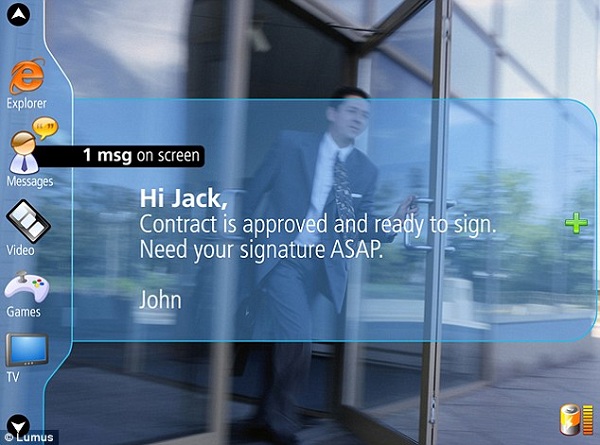Lumus, an Israeli company that is specialized in revolutionary visual tech, showcased recently a product called PD-18-2, a pair of spectacles that display all sorts of information in the visual field.
As todays smartphones have more processing power than the computers we had a decade ago, the obsession to miniaturize everything and to incorporate as many products into a single one does not seem to end any time soon. One of the latest examples is represented by Lumus PD-18-2, a pair of spectacles that overlay the visual field with various types of data, from GPS to email and even TV or games.

PD-18-2 is based on a technology called LOE (Light-guide Optical Element). The full-color high-quality images are captured from a micro-display that is found in the temples and then projected into the eye. The virtual image has a SVGA resolution, so there should be no complaints regarding the quality.
“Following the successful deployment of our first generation PD-18-1 in combat aviation, ground soldier and assembly applications, we are pleased to release our next generation PD-18-2 that takes our competitive superiority to a whole new level. (…) Our new display offers even higher brightness, increased contrast ratio, sharper image, improved image uniformity and enhanced optical efficiency.” declared Dr. Eli Glikman.
Presumably, pilots, soldiers and surgeons will be the first ones to try this product, but these are all risky professions that should not really be used as first adopters of new technologies, if you ask me. Moreover, I do not see where exactly the features pictured below would fit in the job description of the above categories. The whole “contract” thing (I’m turning a blind eye on the web browsing, gaming, video and TV features) would rather be more suitable for a paid assassin or a surgeon who sells organs on the black market.

Besides the fact that these spectacles would cause interminable automobile chain accidents if the manufacturer does not get the transparency levels right, I wonder who would want to use Internet Explorer (pictured above) on such a high-end device. The fact that people text or are on the phone while driving does not seem to be enough. Now their visual field needs to be full of distractions, too. The transparency levels are not the only thing that could go terribly wrong in the case of these spectacles. The temples are so thick that the person who wears them will most likely have no peripheral vision, whatsoever. Not at last, the spectacles look heavy, so wearing them for prolonged periods of time may not be pleasant. Provided that the manufacturer corrects these disadvantages and pushes the product into mass production, PD-18-2 might prove to have some real potential.
If you liked this post, please check the Lumi mask and the Magic Emotion glasses.










